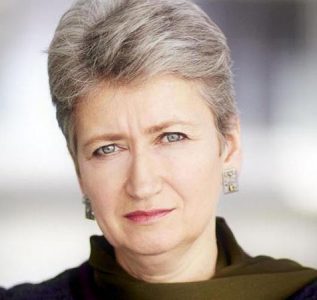Lindsey Hilsum, Channel 4 News’ International Editor has covered the major conflicts of the past two decades, including the wars in Iraq, Afghanistan and Kosovo and was the only English-speaking foreign correspondent in Rwanda when the genocide started. Her first book, Sandstorm, describes the story of the revolution in Libya. She spoke to Fergus Byrne about the horrors that led to the fall of modern history’s most notorious dictator.
There’s a photograph doing the rounds on the internet at the moment. It shows a picture of an old cassette tape alongside a pencil and underneath are the words, ‘Our children will probably never know the link between the two’. It’s an amusing truth but it made me think of some of the other links that our children may not know, such as those that the International News Editor of Channel 4, Lindsey Hilsum made in her recent book Sandstorm. Giving a detailed account of life in Libya before and during the revolt against Muammar Gaddafi she highlights his links to the IRA, the Japanese Red Army, the ANC and even Arthur Scargill. She reminds us that as far as Gaddafi was concerned ‘there was no difference between the IRA planting bombs in Britain, the ANC fighting apartheid in South Africa and the Japanese Red Army, which blew up Lod Airport in Tel Aviv and wanted a global communist takeover.’ His support for Arthur Scargill was because he saw the then leader of the British National Union of Miners as a challenger to Margaret Thatcher. Although Gaddafi may be remembered for his role in the Lockerbie bombing, the killing of PC Yvonne Fletcher in London in April 1984 and the bombing of a Berlin discotheque in 1986, the lengths he went to in sponsoring terrorism around the world were shocking. These are just some of the links affecting the west that one hopes will not be so easily forgotten.
However, what may not be known or understood by those outside of Libya is the culture of fear and intimidation that was the hallmark of Gaddafi’s rule. In Sandstorm Lindsey gives, for example, a detailed account of the Abu Salim massacre—the slaughter of 1270 prisoners in a Libyan jail in June 1996. She talks to an eyewitness who, through a small gap in his cell, watched as the blood-splattered the walls of the prison compound while Gaddafi’s men ‘positioned on the roof shot into the crowd in the yard until no one was left alive.’ The slaughter took hours and the sound of the shots rang out throughout the city of Tripoli. According to Lindsey, a month later Amnesty International had information that something had happened, but their public call for an investigation did not rise above other news stories at the time such as, ‘the war in Bosnia, the bombing of the Khobar Towers in Saudi Arabia, the divorce of the Prince and Princess of Wales.’ Many of the families of Abu Salim prisoners were unaware of the event and carried on bringing food and clothing parcels to their relatives for up to fourteen years, eventually discovering their loved ones were long dead.
Saying that Abu Salim is a place of secrets and Libya is a place of hidden graves, Lindsey Hilsum places this event at the top of the pile of atrocities that took place under Gaddafi’s regime. What began as a popular coup in 1969, when a handsome young military officer led a bloodless take over of power from the then King Idris while he was in Turkey having medical treatment, soon turned into a nightmare that devastated the lives of generations of Libyans. By the mid-70s, with purges, mass arrests, summary trial by Revolutionary Committees and executions becoming a part of life in Libya, Gaddafi was beginning to turn into the sort of dictator that history remembers with far too much painful detail. I asked Lindsey what had happened to that handsome young military cadet who promised change and progress to the Libyan people at the end of the sixties. “I’m sure psychologists could say all sorts of things,” she said. “I mean there’s an obvious progression that we’ve seen many times, which is that somebody comes to power and people put a lot of hope in them because they’re replacing a tired, old system, and then the dictator becomes corrupted by his own power and by other people’s adulation. And that’s a syndrome, like dictator syndrome. With Gaddafi, you added into that his material character and this belief in his own power of thought, so that he developed this strange philosophy which was in the Green Book and it just fed on itself. I think there’s a lot more about Gaddafi to come out. There are a couple of films that have come out recently about his predatory behaviour towards women, particularly young women. I put a little bit of that in the book but many more details have been coming out since.”
In the late seventies, he invented a new word ‘Jamahiriya’, which translates to a ‘state of the masses’. Not wanting parliamentary democracy he had created his own form of government and rule, whilst claiming that he was simply a ‘guide’ to the people of Libya and not their ruler. He set up a system of local community rule which made it difficult for any state infrastructure to exist. He created an atmosphere of mistrust, suspicion and fear. In the end, his rule is seen as more akin to a mafia organisation, with his sons and extended family strategically placed in positions of power and control. He kept control by ensuring that everyone around him was in the dark—never knowing what his real objectives were. He built the World Revolutionary Headquarters outside Benghazi as a training centre for anyone hoping to overthrow a regime that he did not like. It was part of the ‘Centre for Resistance against Imperialism, Zionism, Racism, Reaction and Fascism’ that Gaddafi had set up in 1982. According to Linsdey students included ‘Charles Taylor, who turned Liberia into a killing ground, and ended up on trial for war crimes; Foday Sankoh, whose forces in Sierra Leone were notorious for chopping off people’s arms and legs, raping little girls and forcing little boys to kill members of their family; Laurent Kabila, who ousted Mobutu Sese Seko in Zaire, and presided over an equally brutal replacement regime; Blaise Compaore, who overthrew his best friend, the popular left-wing leader Thomas Sankara, in Burkina Faso; and Kukoi Sanyang, who mounted a coup against the democratically elected government of Gambia.’
When the people of Libya eventually rose up to take on the dictator he warned the rebels that millions from the Sahara would come and ‘cleanse Libya inch by inch, house by house, home by home, alleyway by alleyway, person by person, until the country is cleansed of dirt and scum’. He was calling in favours from some of those that he had given money to in the past. Mercenaries, many of whom had fought in wars that Gaddafi had funded, came to fight against the rebels—then a motley crew of ex-pats and young boys who had never seen a gun in their lives. I asked Lindsey what she thought would have happened if there hadn’t been NATO intervention. She replied that Gaddafi would probably still be in power but more importantly there would likely have been massacre on a huge scale. She said: “Some people say maybe intervention was a bad idea. But being in Benghazi just before the intervention, I have no doubt that Gaddafi meant what he said. And I have no doubt that he would have gone alleyway to alleyway slaughtering people in Benghazi, so I think there would have been a huge loss of life and I think there would have been a massive refugee exodus to Egypt—which could have destabilised Egypt.”
The story of how Gaddafi met his end is well documented but how the country is to rebuild after the revolution is another matter. Lindsey points out that the Arab Spring uprisings in Tunisia and Egypt removed leaders, but left the infrastructure of government intact, whereas Libya’s revolution has torn apart an albeit corrupt and fragile state and left a potentially very dangerous vacuum in its place. She explained how the dictator’s absolute power has made it difficult to create any kind of cohesion amongst the many rival groups now vying for position in the new Libya. “I think what we’re seeing is the legacy of the Gaddafi years,” she says. “Power was concentrated in one man, he was the spider at the centre of the web and no one else was allowed to make a decision at all, and so no one else can make a decision and that’s why central government, such as it is, is so weak. Central government is made up of academics and a few businessmen—they’re a bunch of dithering old men.” She explained that because Libya is now “allergic to the idea of a strong man” they have gone from this very strong state of power centralised in one man to, “complete dither and failure to make any decisions at all.”
Using interviews with some of those that came back to Libya to join the revolution, as well as with people who never left but had never seen, let alone spoken to, a foreign journalist, Sandstorm often reads like a novel. At times one feels like a voyeur observing lives and sitting at the dinner table sharing the intimacies of tragic family life. At other times one can only wonder at the depths of human depravity. I asked Lindsey why, after covering conflicts all over the world, she had decided to write a book about Libya and she explained that because Libyans inside the country had never been able to speak openly to foreigners because of the repression, they also couldn’t speak to each other. “And there is a moment after a revolution,” she said, “when people are speaking for the first time and it is an extraordinary moment. It doesn’t last very long, maybe six months, when people are telling their stories and they are desperate to talk. And I was very keen to catch that moment and I think that’s what the book is really—it’s the moment when people are talking for the first time about what they’ve endured.”
Today, a year on from the revolution that toppled a dictator’s 42-year reign, Libya is still in a delicate state. Armed militia battle for position and the town of Bani Walid, a Gaddafi stronghold is still in the hands of those who supported him. Indeed the man who found Gaddafi was captured there and tortured for two months before dying. In a recent blog, Lindsey pointed out that ‘those who fought for liberation have to overcome their own propensity for violence and find other ways to settle disputes, or Libya will never emerge from the shadow of dictatorship and conflict.’










